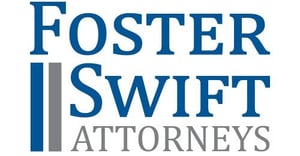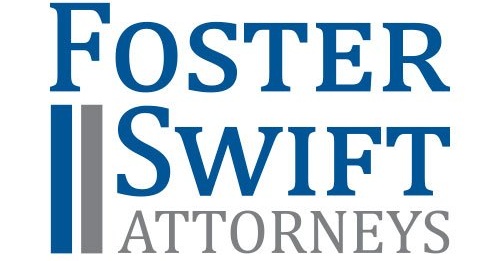
Chris Holman welcomes back Anthony Dalimonte, Attorney, Foster Swift Collins & Smith PC, Southfield, MI, one of Foster Swift's six branches across Michigan.
Watch Anthony and Chris discuss the upcoming webinar in October that will guide businesses through many issues connected to labor and employment law in the YouTube video shared below:
In their conversation, Chris looked to find out several things from Anthony;
Foster Swift has an exciting upcoming event that everyone should know about and it's happening on October 12 at 9 am.
Tony, can you tell us a little bit about that?
-Would love to, our labor and employment team at Foster Swift is putting on a “Fall Labor and Employment Law Update” to discuss major issues and developments that employers should be aware of. A list of the topics can be found on our website but we are going to be discussing: unemployment insurance matters, employee misclassification, drug testing, developments in noncompete agreements, workplace monitoring, and religious discrimination.
Why don’t you give us a teaser and talk about one of those topics?
-Would love to. Last month the US Supreme Court made a ruling that significantly changed the landscape of religious accommodations. In Groff v Dejoy, the question was whether the employer had violated the employee’s Title VII rights in not granting his request for a religious accommodation when the employee refused to take any Sunday shifts and was disciplined for it. The rule, until this case, was that requiring the employer to bear more than a de minimis cost to provide a religious accommodation is an undue hardship.
-In a rare unanimous decision, the Supreme Court changed this rule and held that employers who deny religious accommodations must show that the burden of granting an accommodation would result in “substantial increased costs in relation to the conduct of its business.
So what does this mean for employers?
-Justice Alito stated in his opinion that “faced with an accommodation request like Groff’s, an employer must do more than conclude that forcing other employees to work overtime would constitute a hardship. Consideration of other options will also be necessary. We recommend that you educate your HR staff and managers on how to apply the new standard to employee requests and explore all avenues in responding to requests based on religious beliefs. This also means reviewing all avenues that aren’t the least expensive or the most convenient. There is a possibility that this ruling could result in more religious accommodation requests.
Below is more information as provided by the Foster Swift website:
Fall 2023 Labor & Employment Law Update
October 12, 2023
Laws surrounding labor & employment are constantly changing and 2023 has been no exception. To learn more about the major issues and developments your company needs to address now for 2024, you're invited to join our Fall 2023 Labor & Employment Law Update. Below are the details of this webinar along with some short articles to give you a preview of what is to come.
Save the Date: Agenda and Presenters
October 12, 2023
- When: Thursday, October 12 from 9:00-11:30 am; an optional 30-minute Q&A session to follow.
- Cost: Free
- Registration: https://us06web.zoom.us/webinar/register/WN_QANDjYvyRt-Cz3R76NbSNw
- What to Expect:
- Unemployment Insurance Matters
- Amanda Afton Martin will explain the importance of preparing for an unemployment insurance hearing and its impact on an employer’s unemployment tax. You will learn what to expect before appearing before an Administrative Law Judge (ALJ) and why it is valuable to seek legal counsel to represent you.
- Employee Misclassification
- Mike Blum will explore the always-evolving dilemma of misclassification and what constitutes an employee or an independent contractor. Mike will look at classification on the federal vs. state level and discuss the status of new tests proposed or implemented by various agencies, including the:
- IRS common law test,
- the DOL’s ABC test,
- the NLRB’s new independent contractor standard, and
- the consequences of misclassification under the workers’ compensation law.
- Mike will also discuss the implications improper classification has on Gig workers, which include independently employed or subcontract workers and staff agency employees. Due to the significant potential liability, being proactive about correctly classifying your employees is crucial.
- Mike Blum will explore the always-evolving dilemma of misclassification and what constitutes an employee or an independent contractor. Mike will look at classification on the federal vs. state level and discuss the status of new tests proposed or implemented by various agencies, including the:
- Drug Testing
- Should you test your employees for marijuana? Mark Koerner will discuss cases involving drug-testing employees along with what you should include in your policy to cover all your basics. Mark will also review the recent Department of Transportation's (DOT) final rule to amend regulations, allowing oral fluid testing for employees in the transportation industry. This development is set to streamline the drug testing process.
- Noncompete Developments
- A topic that is on every company's mind, Karl Butterer will delve into the NLRB's recent decision to make nearly all noncompetes unlawful. This segment will also explore non-solicitation agreements, separation contracts, confidentiality clause enforcement, and how it affects nonunionized workforces. Karl will also take a look at the Thryv decision and its implications in which the NLRB held that the employer violated the NLRA by unilaterally laying off six employees in violation of the statutory duty to bargain.
- Employers' Use of AI
- Tony Dalimonte will discuss an area that is transforming how employers review and hire potential candidates, using generative artificial intelligence (AI) to streamline applicant screening. However, there are a number of potential legal dilemmas that can arise and Tony will delve into what you should discuss with your legal counsel prior to implementing generative AI software.
- Workplace Monitoring
- Cliff Hammond will examine the scrutiny of workplace monitoring and its lawfulness under certain circumstances. What can employers keep track of? Are they allowed to keep tabs on employees' whereabouts using GPS? Tracking of keystrokes?
- In addition, Cliff will also examine:
- Religious discrimination and what reasonable accommodations employees can make.
- Are non-disparagement clauses enforceable?
- Revisit what has changed in the workplace in the wake of COVID.
- Unemployment Insurance Matters
» Visit MBN website: www.michiganbusinessnetwork.com/
» Subscribe to MBN’s YouTube: www.youtube.com/channel/UCqNX…
» Like MBN: www.facebook.com/mibiznetwork
» Follow MBN: twitter.com/MIBizNetwork/
» MBN Instagram: www.instagram.com/mibiznetwork/
















